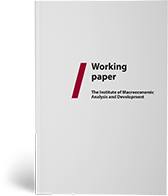Working papers
The Working Paper series features in-house papers and contributions by external authors relevant to our work. Here we publish papers that address development issues from a variety of methodological, empirical and theoretical perspectives. The topics addressed in our working papers can also form the basis for other IMAD reports. The main purpose of the papers is to stimulate the exchange of ideas on current economic and development issues. It is important that the analyses are published in a timely manner, even if the results are still preliminary. The contents of the papers may be reproduced in whole or in part provided that the source is acknowledged. Authorship should be attributed to the author and not to IMAD.
T. Golob Šušteršič: Embeddedness of Slovenia in the global economy: Trade in value added and global linkages
The working paper analyses Slovenia’s position in international trade and global production linkages. It contains an overview of a series of indicators pertaining to GVC integration and trade in value added, calculated using data from the World…
B. Bratuž Ferk, T. Čelebic, H. Mervic, J. Pečar, M. Perko, A. Selan, U. Sodja: A review of gender differences in Slovenia in selected fields
The working paper presents differences between men and women in selected fields: demography, education, labour market, pensions and women in key decision-making positions. More than half of Slovenia's population are women, as women live longer than…
J. Povšnar, M. Koprivnikar Šušteršič, M. Kovac, J. Kusar, T. Nenadič, A. Vidrih: Analysis of Slovenian companies' performance in 2016, by activity
This working paper analyses business results of Slovenian commercial companies using AJPES statistical
data from companies’ balance sheets and profit and loss statements. The analysis covers the period 2008–2016 (following the revision of NACE in…
J. Pečar: How is life in Slovenian regions
In modern societies, the well-being of the population is one of the main development goals. Many factors
affecting the quality of life of the population have their origin in the local environment. Therefore, the
measurement of prosperity at lower…

